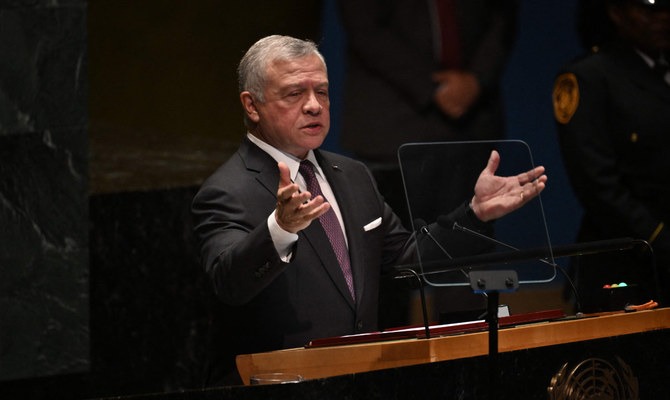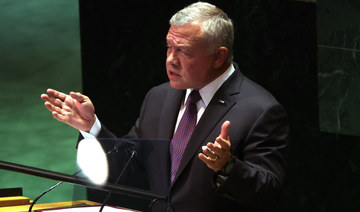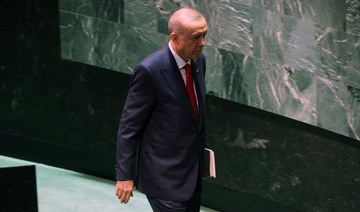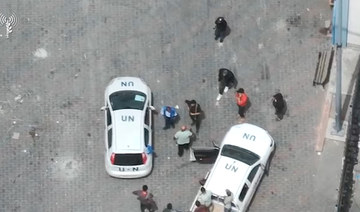NEW YORK: The Middle East is at a “critical crossroads,” but a new narrative based on peace and prosperity can be created through economic investment, Jordan’s King Abdullah II said on Wednesday.
The country is battling the twin threats of surging numbers of refugees and a booming drug- and weapon-smuggling trade along the Syrian border, he warned.
The king was the keynote speaker at the inaugural Middle East Global Summit in New York, organized by Al-Monitor and Semafor, and attended by Arab News.
“Our region will continue to suffer until the world helps lift the shadow of the Palestine-Israel conflict — the central issue of the Middle East,” he said, adding that the post-COVID-19 world has brought with it a regional desire to “put the past behind us” and find a solution to the conflict.
“Every year, Ramadan, Passover and Easter create bloodshed. This is the toughest year for Palestinians with the death rate in the past 15 years.”
The king highlighted the need to address changing generational trends in Palestine, saying: “We — Jordanians, Arabs, Israelis, Americans — don’t know who the younger generation of Palestinians are.”
He added that the Middle East has an opportunity to break down barriers to peace through regional projects.
He praised Saudi Arabia’s role in opening regional economic networks, adding that the private sector plays a key role in building opportunities for dialogue between competing sides.
The king said economic incentives can encourage peace in the region, adding: “We can provide that new narrative for the region.”
He said a major flaw of Israeli policy is the belief “that you can parachute over Palestine. That doesn’t work.”
He added: “Unless we solve this problem, there will never be a true peace. So we’re working at the moment on how to bring this together. There are a lot of moving parts.”
The king also spoke on the issue of refugees, who make up one-third of Jordan’s population. He warned on Tuesday at the UN that “Jordan’s capacity to deliver necessary services to refugees has surpassed our limits. Jordan won’t have the ability nor the resources to host and care for more.”
He said international “fatigue” and the war in Ukraine have played a role in the global community’s ignorance of the refugee issue. “This is a problem that’s going to come back and affect all of us,” he added.
The king said the recent outbreak of protests in southern Syria could signify the emergence of a new wave of refugees.
“People are demonstrating because they’re suffering, so we (Jordan) and the Lebanese could be faced with another wave of refugees,” he said.
“From a Lebanese and Jordanian perspective … we can’t take any more. We’re already overburdened.
“The international support has dwindled dramatically, whether it’s the UNHCR (UN High Commissioner for Refugees), the World Food Programme.
“Donor countries are literally cutting aid to Jordan 50 percent every year. We’re getting nothing compared to what we as a government are trying to put in to support (refugees). It’s a moral challenge.”
He described the recent surge in drug and weapon smuggling from Syria as being Iranian in origin, with Tehran targeting Jordan as a “staging ground” for its foreign policy.
“We’re fighting every single day on our borders to stop massive amounts of drugs coming into our country,” he said.
The king added that Iran is trying to sway Iraq’s government away from integrating with Jordan and the Arab Gulf states — an issue that requires a regional effort to address.
He praised Saudi Arabia’s rapprochement with Iran, saying Riyadh “was asking the question” of why the rivalry exists in the first place — a step that Tehran must also take.
He highlighted the importance of economic investment as a means to break down barriers to peace, saying Saudi Arabia’s Vision 2030 reform plan serves as a powerful model.
“The Saudis have a very ambitious and very strong mobilization program. Crown Prince Mohammed bin Salman has a lot of support from the youth in the country to do these projects.”




























